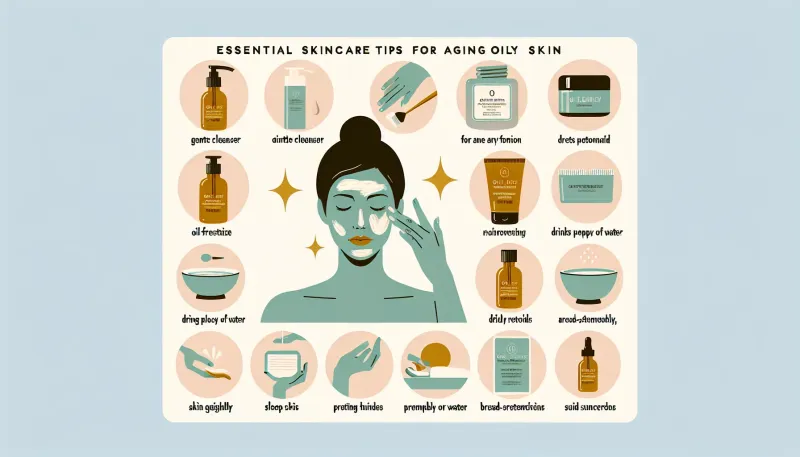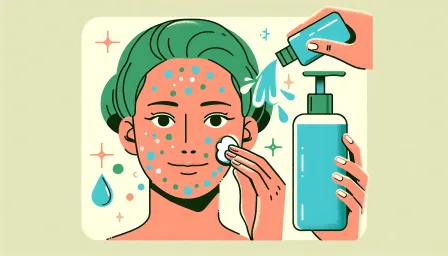Essential Skincare Tips for Aging Oily Skin

Discover essential skincare tips for aging oily skin. Learn how to manage both aging signs and oily skin issues with our expert-recommended strategies.
Aging is an inevitable part of life, and its effects on the skin can be a major concern, especially for those with oily skin. Managing both aging signs and the challenges of oily skin might seem daunting, but with the right knowledge and skincare routine, it is possible to maintain a healthy, youthful appearance.
Understanding Aging and Oily Skin
As the skin ages, it undergoes several changes that can be particularly challenging for individuals with oily skin. Below, we explore the intricacies of aging on oily skin and provide actionable tips to tackle these issues effectively.
Why Does Oily Skin Age Differently?
Oily skin tends to produce more sebum, which can lead to various skin concerns. While excess oil might contribute to fewer wrinkles, it can also result in enlarged pores, acne, and other texture irregularities.
Common Issues for Aging Oily Skin
- Wrinkles and Fine Lines: Oily skin isn’t immune to the formation of wrinkles and fine lines.
- Pore Appearance: Enlarged pores can become more pronounced with age.
- Acne: The continuous production of sebum can sustain acne issues well into older age.
- Skin Texture: Aging can exacerbate improper skin texture, making it uneven and rough.
Skincare Routine for Aging Oily Skin
Developing an appropriate skincare routine tailored for aging oily skin can significantly alleviate many of the aforementioned concerns. Here are key steps to include:
1. Cleansing
Cleansing is crucial for managing oily skin. Use a gentle, non-comedogenic cleanser that effectively removes excess oil without stripping the skin of its essential moisture. Incorporate ingredients like salicylic acid to help keep pores clear.
2. Toning
An alcohol-free toner can help balance the skin’s pH and remove any residual cleanser. Look for toners with ingredients like glycolic acid or witch hazel to help refine pores and control oil production.
3. Exfoliating
Regular exfoliation is necessary to prevent clogged pores and maintain smooth skin texture. Opt for chemical exfoliants containing AHAs (alpha hydroxy acids) or BHAs (beta hydroxy acids) approximately 1-3 times a week to gently exfoliate without over-drying the skin.
4. Moisturizing
Hydration is vital, even for oily skin types. Use lightweight, oil-free moisturizers with hyaluronic acid or glycerin to keep the skin plump and hydrated without further contributing to oiliness.
5. Sun Protection
Daily sun protection is non-negotiable. Opt for a non-comedogenic, oil-free sunscreen with at least SPF 30. Sunscreen not only protects against harmful UV rays but also helps in preventing premature aging signs.
Ingredients to Look For
Choosing the right ingredients is crucial for managing aging oily skin. Here are some beneficial components:
Retinoids
Retinoids, such as retinol or tretinoin, are powerful anti-aging ingredients that help in increasing cell turnover, minimizing wrinkles, and improving overall skin texture.
Niacinamide
Niacinamide is known for its anti-inflammatory properties and can help in reducing the appearance of enlarged pores, evening out skin tone, and controlling sebum production.
Vitamin C
Vitamin C is an antioxidant that can brighten the skin and reduce signs of aging by neutralizing free radicals. Additionally, it helps in collagen production.
Diet and Lifestyle Tips
Skincare isn't just about the products you apply; diet and lifestyle also play a significant role:
1. Hydrate
Drink plenty of water to keep your skin hydrated from within.
2. Healthy Diet
Consume a balanced diet rich in antioxidants, Vitamins, and minerals to support skin health. Incorporate foods such as fruits, vegetables, and fatty fish.
3. Reduce Stress
Chronic stress can exacerbate skin issues. Practice stress management techniques such as meditation, yoga, or other relaxation methods.
4. Adequate Sleep
Ensure you get enough sleep to allow your skin to repair and regenerate. Aim for 7-9 hours of sleep per night.
Consulting a Dermatologist
If you find over-the-counter products and home remedies aren’t delivering the desired results, consider seeking advice from a dermatologist. They can prescribe treatments tailored to your specific skin type and concerns.
Conclusion
Managing aging oily skin requires a well-rounded approach involving the right skincare routine, beneficial ingredients, and healthy lifestyle choices. By following the expert tips outlined above, you can address common aging concerns while keeping oily skin under control, leading to a more youthful, radiant complexion.



























